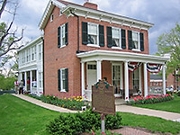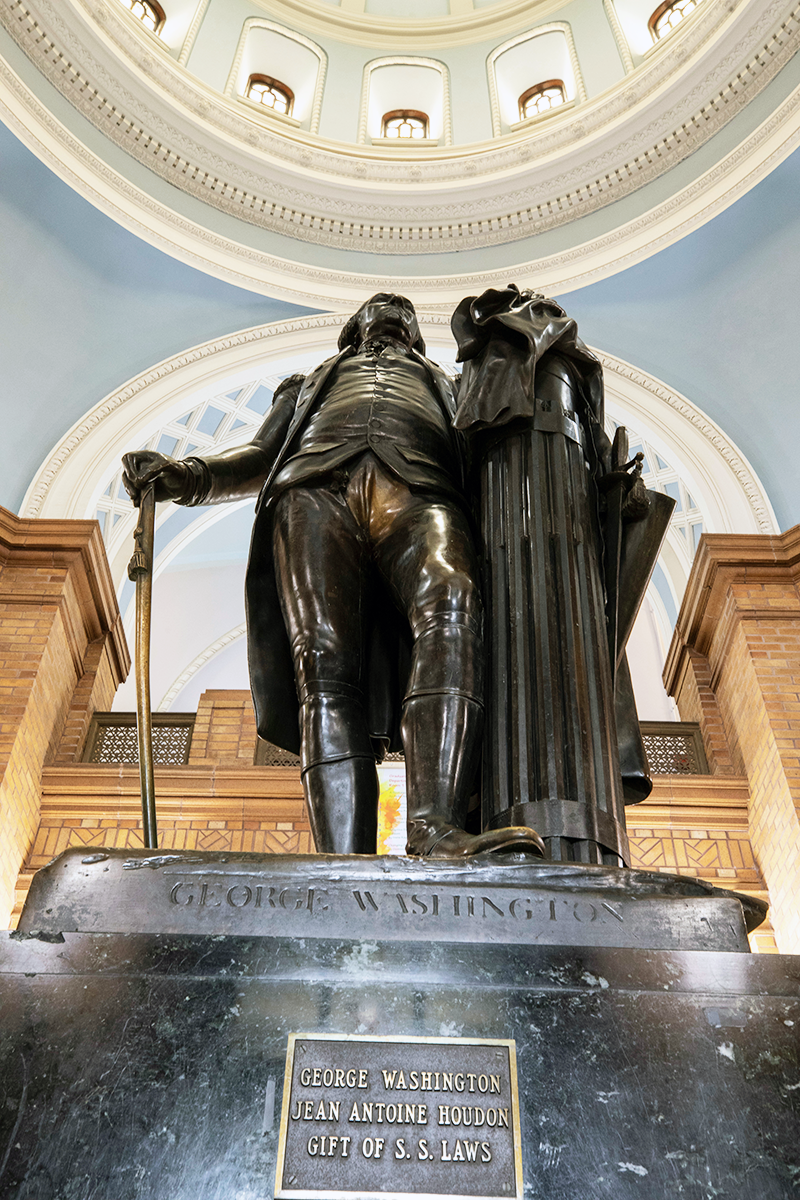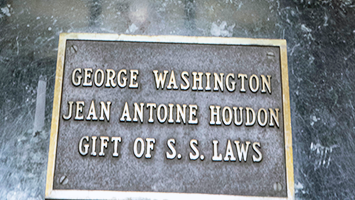
Dear Bronze George, What's Your Story ?
By Lois Cocanougher, 2019 (Miami ’71, ’75)
Who is this bronze person on Miami’s campus?
George Washington is represented on the campus of Miami University in the form of a bronze statue made by William James Hubard of Richmond, Virginia. It is a copy of the original marble statue made by French sculptor, Jean Antoine Houdon.
The story of the George Washington statue

The Virginia General Assembly wanted to honor George Washington, native son, Revolutionary War leader, and our nation’s first President, with a statue to be placed in the state capitol building. The original marble statue was completed in 1792 by French sculptor, Jean Antoine Houdon, and stands in the rotunda of the Virginia State Capitol Building in Richmond, VA. It was made from precise measurements of the living George Washington, including molds made from a mask of Washington’s face. The statue is life size showing George Washington at age 53, about 210 pounds, and 6 feet 2.5 inches tall. The statue was so realistic that George Washington himself called it “a verisimilitude” of himself. The Marquis de Lafayette, Washington’s aide de camp during the Revolutionary War, said “that is the man himself. I can almost realize he is going to move.” (The Miamian 6/15/1978, p. 5)
Why was this Miami statue made?
After an 1831 fire destroyed the North Carolina state house, including their statue of George Washington by Antonio Canova, the state of Virginia feared the same disaster might happen to their statue. Therefore, in 1854, Virginia authorized William Hubard to make copies of their Houdon statue.
Hubard made molds of the original statue and cast six bronze copies from these molds. The copy now in Alumni Hall of Miami University, was the sixth one made in Hubard’s foundry. It was cast in 1860 and weighs 2,300 pounds. Hubard died in 1862 in an explosion in his factory while making munitions for the Confederacy, and a sometime later, his molds were destroyed. No more reproductions could be made, making Miami’s statue quite old and very rare.
The other Hubard copies are placed at Virginia Military Institute, North Carolina State Capitol, South Carolina State House, St. Louis, Missouri, and New York City Hall.
On a side note, in 1909, the state of Virginia decided to give permission to the Gorham Company for more copies to be made of the original marble statue. Now, more than 25 copies of the original statue stand across the United States, South America, France and Great Britain.
Why is this statue on Miami’s campus?

Inscription on statue base reads 'George Washingon. Jean Antoine Houdon. Gift of S.S. Laws'
Miami alumnus, Samuel S. Laws, class of 1848, donated the statue to Miami on Graduation Day, June, 1920. Laws, an admirer of great men, had lived an illustrious life as a minister, an attorney, a physician, a businessman, an educator, and an inventor. Laws was then honored as Miami’s oldest living alum at age 96. (1824-1921)
Where has this Miami statue been before coming to Miami?
In 1883, while Samuel Laws was president of the University of Missouri, (1876-1889), he purchased the statue from William Hubard’s widow. Mrs. Hubard had it removed from a city park in Richmond, Virginia after she sold it to Laws. Samuel Laws then had the statue placed on the front lawn of the University of Missouri president’s house. He hoped the University would pay him back for the cost of the statue, but the University refused. Before Laws left the University of Missouri, he had the statue moved to Kansas City, later to the Cincinnati Art Museum, the Corcoran Art Gallery in Washington DC, and then to Miami.
Before the statue was donated to Miami, records show that there was a possible sale of the statue to the Federal Government for $10,000. When no agreement was reached on this sale, Laws gave the statue to Miami. Samuel Laws was proud to give it to Miami, to be placed in the rotunda of then Alumni Library, and hoped the students would have patriotic feelings as they passed by the statue.
Where has this statue has been on campus?
- 1920 Alumni Library, Miami University
- 1960 Benton Hall, renamed Hall Auditorium in 1968, Miami University
- 1978 Art Museum, Miami U., without its base (in storage for two years)
- 1981 again in Alumni Hall, now home of the Architecture Dept. of Miami University
What is the symbolism on the statue?
- Washington is represented in his Revolutionary war uniform but holds a civilian walking cane.
- Behind him is a farmer’s plowshare representing his role as a farmer and agriculture as our nation’s strength.
- Left hand resting a column representing civil authority.
- Thirteen rods of the column, like a Roman fasces, represent the thirteen colonies.
- Arrows on the column represent Native Americans or America’s wild frontier.
- Washington’s sword is put aside resting on the column next to his cape, independence gained.
- Miami’s George Washington statue is one of more than 25 copies, but one of only six cast by William Hubard before the Civil War. A valuable work, indeed.
Timeline of the George Washington Statues
- 1784 Virginia General Assembly ordered the statue. Thomas Jefferson found the sculptor, Jeanne Antoine Houdon, in France.
- 1785 Houdon came to Virginia to take measurements of George Washington.
- 1792 Marble statue of George Washington completed, and put on display in Paris until the Virginia Capitol was finished.
- 1796 Virginia capitol completed and the marble statue of Washington placed in the rotunda.
- 1854 Virginia legislature authorized William James Hubard to make molds of the original marble statue to cast bronze copies.
- 1860 The sixth bronze copy is cast, eventually coming to Miami University, Oxford, OH.
- 1862 William Hubard died from factory explosion while making munitions for the Confederacy.
- 1862-1865 William Hubard’s molds destroyed.
- 1870 William Hubard’s sixth bronze statue placed in a city park in Richmond, Virginia.
- 1883 Samuel Laws bought the statue from William Hubard’s widow, and has it moved to the University of Missouri.
- 1887 Samuel Laws had the statue moved to Kansas City, Missouri.
- 1898 Samuel Laws had the statue moved to the Cincinnati Art Museum.
- ???? Statue moved to the Corcoran Art Gallery in Washington DC.
- 1909 Gorham Company authorized by Virginia to make additional copies from the original.
- ???? A possible sale of Samuel Laws’ statue to the US government for $10,000.
- 1920 Samuel Laws gave the statue to Miami University to be placed in Alumni Library.
- 1935 Miami class paid for the green marble base of the statue.
- 1960 Miami’s statue moved from Alumni Library to Benton Hall/Hall Auditorium
- 1978 Miami’s statue, without the base, moved to the Art Museum for the grand opening. (An alum and donor to the Art Museum wanted the statue placed there)
- 1979 Miami’s statue placed in storage at the Art Museum.
- 1981 Miami’s statue returned to the rotunda of Alumni (Library) Hall, home of the architecture department where students rub his foot for good luck, and pose for graduation photos.
References
Baer, Elizabeth, “The History of Miami University Libraries,” Miami University, the Friends of the Miami University Libraries, Oxford, Ohio, 1997, p. 184.
Bob Vila interview, Virginia State House, https://www.youtube.com/watch?v=GUcsaZkNh7k
“George Washington crosses the Dela…er, Campus,” The Miamian, June 15, 1978, p. 5. *
“George Washington, Marble Statue,” edu.virginia.gov/online_classroom/shaping_the_constitution/doc/washington
“George Washington Statue,” information sheet condensed from the pamphlet, “The Image of Washington: The History of the Houdon Statue,” by Ronald E. Heaton, Norristown, PA, 1971. *
Havighurst, Walter, “Men of Old Miami, 1809-1873, a Book of Portraits,” G.P. Putnam and Sons, New York, 1974, pp. 95-109.
https://en.wikipedia.org/wiki/George_Washington_(Houdon)
Layton, Robert C., Phil Riggan, and Paul DiPasquale, “Discovering Richmond Monuments: A History of River City Landmarks Beyond the Avenue, 2013. (Special Collections, Library of Virginia)
“Miami’s statue of Washington—its origin and travels over a 97-year period,” Miami Alumnus Vol. 16, No. 8, May, 1963, p. 11. *
National Society Daughters of the American Revolution, “Finding George Washington,” “American Spirit Magazine,” November/December 2018, pp. 8-10.
Owsley, Rebecca, “Oh George, poor George,” Hamilton Journal News, Oct. 1, 1981, p. B 1. *
“Statue of George Washington Given to Miami,” Miami Student, May 7, 1920, p. 1
Smith, Holly, “Finding George,” Walter Hines Page Chapter, National Society Daughters of the American Revolution, London, UK, February 6, 2019.
“The Portrait Statue of George Washington,” Cincinnati Art Museum. (no date) *
“The Washington Statue,” Miami Alumnus, Jan. 1, 1949, p. 16. *
Virginia records: No. 6—Miami University, Oxford, Ohio, 1889. *
“Washington Statue By Houdon Foremost Art Treasure Here,” newspaper clipping (no source, no date) *
*Item found in Special Collections, King Library, Miami University, Oxford, Ohio
Thanks
Tiffany Dogan, Special Collections, King Library, Miami University, Oxford, Ohio
Steve Gordon, Administrator, McGuffey House and Museum, Miami University, Oxford, Ohio
Meghan Townes, Special Collections, Library of Virginia, Richmond, Virginia
William Holmes McGuffey House and Museum
We aim to collect, preserve, interpret, and exhibit materials relating to the life of William Holmes McGuffey, the McGuffey Eclectic Reader series, the history of Miami University, and 19th-century domestic life and architecture of southwest Ohio.

Hours of Operation
Thursday - Saturday
1:00pm - 5:00pm
McGuffey House and Museum observes Miami University closings and other special events.
Summer Hours 2024
Thursday - Saturday 1:00 PM - 5:00 PM
Closed
Saturday, May 25 for Memorial Day
Thursday-Saturday July 4-6 Independence Day